Search Results
Showing results 61 to 77 of 77
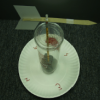
Design and Build a Wind Vane
Source Institutions
In this activity, learners design and build a simple wind vane —one of the oldest kinds of weather tools— and use it to show wind direction.
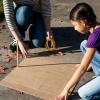
Ancient Sun Observations
Source Institutions
In this activity, learners make their own Sun tracker to explore how ancient civilizations around the world studied the Sun.
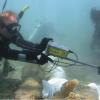
Excavating and Mapping Under Water
Source Institutions
In this archaeology activity, learners consider ways in which excavating an underwater site is different from excavating a terrestrial site.

Space Stations: Sponge Spool Spine
Source Institutions
In this activity, learners simulate what happens to a human spine in space by making Sponge Spool Spines (alternating sponge pieces and spools threaded on a pipe cleaner).
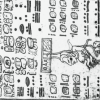
Breaking the Code: Mayan Math
Source Institutions
This is a lesson plan for an activity in which learners, playing the role of archeologists, use math concepts about number bases to decipher the Dresden Codex, an ancient Mayan document.

Take a Tectonic Vacation
Source Institutions
This multi-part activity from the National Parks Service blends the science of plate tectonics with the culture and history of places with dramatic geologic landscapes.
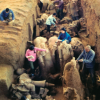
Where in the World is the Terra Cotta Army?
Source Institutions
In this activity, learners find Xi'an, the archaeological area in China where the Terra Cotta Army was discovered, on a map or globe and look more closely at the relationship of the warrior site to ot

Building Bingo
Source Institutions
In this on site "field trip" activity (located on pages 6-9 of PDF), learners get hands-on experience identifying building materials by playing "Building Bingo".

Environmental Chemistry
Source Institutions
In this activity with several mini experiments, learners explore the chemistry that helps scientists learn about the environment and how they can help save it.

Space Elevator
Source Institutions
In this activity, learners imagine what the world might look like if we could build an elevator to space!

Tomb Mapping
Source Institutions
In this activity, learners examine the culture and history of the tomb site.

Invent a Plant
Source Institutions
In this activity, learners construct models of plants that are adapted to living under specific environmental conditions.

Arctic Sea Ice
Source Institutions
In this activity, learners explore how the area of Arctic sea ice has changed over recent years. First, learners graph the area of Arctic sea ice over time from 1979 to 2007.

Folding Matters
Source Institutions
In this activity, learners explore how the process of folding has impacts on engineering and is evident in nature.

Exploring Strange New Worlds
Source Institutions
This fun and simple hands-on astronomy activity lets learners explore model planets (that they or an educator will create), using methods NASA scientists use to explore our Solar System.
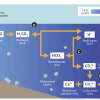
Coral, Carbon Dioxide and Calcification
Source Institutions
In this group activity, learners act out key stages of the "ocean carbon cycle" (also known as the "carbonate buffer system") through motions, rearranging blocks and team tasks.
Building a Community From the Ground Up
Source Institutions
In this activity, a group of learners work collaboratively to design and construct a paper model showing the evolution of an environment through multiple stages, from prehistory through the modern cit
